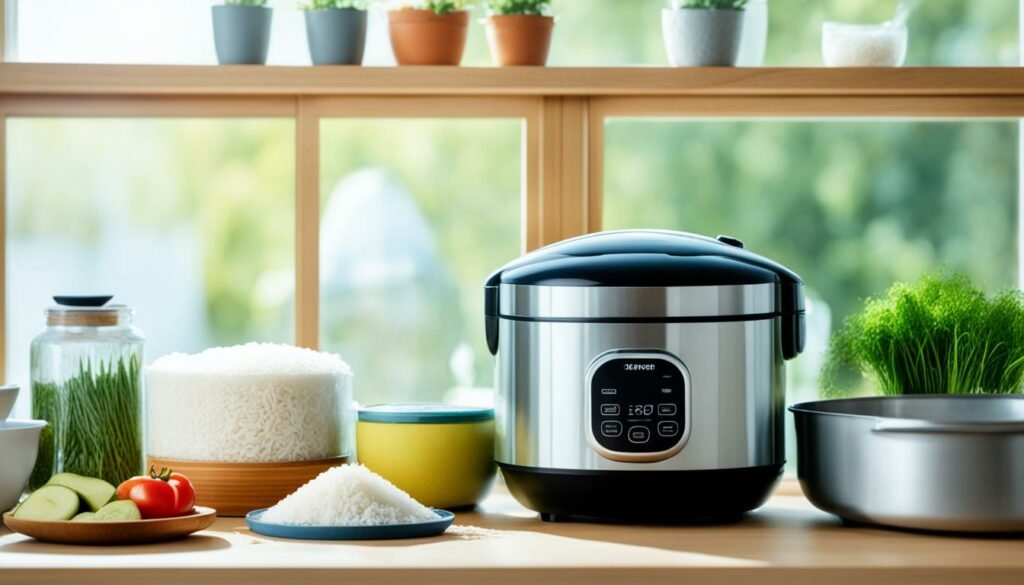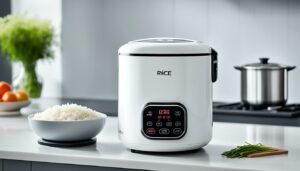Imagine this: you’ve just enjoyed a delicious meal of perfectly cooked rice made with your trusty rice cooker. The aroma fills the air, and every grain is fluffy and tender. As you take the last bite, a sense of satisfaction washes over you. But now, it’s time to clean up and store your rice cooker until the next time you need it.
Storing your rice cooker properly is essential to ensure its longevity and maintain the quality of your cooked rice. You want to make sure that every time you use your rice cooker, it performs as flawlessly as it did today. That’s why we’re here to guide you with expert tips on how to store your rice cooker when it’s not in use.
In this article, we will provide you with valuable insights into preserving your rice cooker’s longevity, avoiding contamination and moisture damage, and maintaining the quality and flavor of your rice. From prepping your rice cooker for storage to choosing the right location and properly storing accessories, we’ve got you covered.
So, let’s dive in and discover how to store your rice cooker properly, ensuring that every time you cook rice, it’s nothing short of perfection.
Table of Contents
ToggleUnderstanding the Importance of Proper Rice Cooker Storage
Proper rice cooker storage is essential for preserving its longevity. When stored correctly, your rice cooker can last for many years without any issues. Additionally, storing your rice cooker properly helps to avoid contamination and moisture damage, which can affect both the appliance and the rice. By following the right storage practices, you can also maintain the quality and flavor of your cooked rice.
Preserving Your Rice Cooker’s Longevity
Preserving your rice cooker’s longevity starts with proper storage. When not in use, make sure to clean and dry the rice cooker thoroughly before storing it. This removes any moisture and food residues that could lead to mold or bacterial growth. Store the rice cooker in a cool, dry place to prevent humidity and temperature fluctuations that can cause damage over time.
Avoiding Contamination and Moisture Damage
Contamination and moisture damage are common concerns when it comes to rice cooker storage. To avoid contamination, remove the inner pot from the rice cooker and store it separately. This prevents any leftover food or residues from contaminating the appliance. Additionally, seal the storage container or bag properly to keep out moisture and prevent any damage to the rice cooker.
Maintaining Rice Quality and Flavor
Proper storage of your rice cooker plays a crucial role in maintaining the quality and flavor of your cooked rice. When stored correctly, the rice cooker retains its functionality, ensuring even and precise cooking. This results in consistently delicious rice every time you use the appliance. By keeping your rice cooker in good condition, you can enjoy perfectly cooked and flavorful rice for years to come.
Prepping Your Rice Cooker for Storage
Before storing your rice cooker, it’s important to take some prepping steps to ensure its cleanliness and safe storage. By following these steps, you can avoid any potential issues and prolong the lifespan of your rice cooker.
1. Clean and dry thoroughly: Start by cleaning the inner pot, lid, and any removable accessories of the rice cooker. Use warm soapy water to wash them, and make sure to remove any leftover rice or residue. Rinse thoroughly and dry them completely before storing. This helps prevent bacterial growth and maintain a hygienic environment for your cooker.
2. Disconnect from power: It’s important to disconnect the rice cooker from the power source before storing it. Unplug the power cord from the electrical outlet and detach it from the cooker. This not only prevents accidental power consumption but also protects the cooker from any electrical issues during storage.
3. Remove excess moisture: Ensure that the rice cooker is completely dry before storage. Wipe the exterior of the cooker with a clean, dry cloth to remove any moisture. Excess moisture can lead to mold growth or damage to the appliance, so it’s essential to keep it dry.
Once you have completed these prepping steps, you can proceed to store your rice cooker in a safe location. Proper prepping ensures that your rice cooker remains in good condition and is ready for use whenever you need it.

| Prepping Steps for Storing Your Rice Cooker: |
|---|
| Clean and dry the inner pot, lid, and accessories thoroughly |
| Disconnect the rice cooker from the power source |
| Ensure the rice cooker is completely dry |
How to Store Your Rice Cooker When Not in Use
Properly storing your rice cooker when it’s not in use is key to ensuring its longevity and keeping it in good condition. In this section, we’ll discuss the important factors to consider when storing your rice cooker, including choosing the right location, storing the accessories, and properly handling the cord.
Choosing the Right Location
When selecting a location to store your rice cooker, it’s essential to find a cool, dry, and well-ventilated area. This will help prevent any moisture damage or mold growth, which can negatively impact both the appliance and the quality of your cooked rice. Consider finding a spot in your kitchen or pantry that meets these criteria.
Properly Storing Accessories
In addition to the rice cooker itself, it’s important to pay attention to the accessories that come with it, such as the measuring cup and rice spatula. To prevent scratching or damage, store these accessories separately from the rice cooker. You can place them in a secure container or drawer specifically designated for rice cooker accessories.
Tips for Storing the Rice Cooker Cord
The cord of your rice cooker is often overlooked when it comes to storage. To keep it in good condition and avoid potential tangles or damage, it’s recommended to wrap the cord neatly and secure it. Consider using twist ties or cord organizers to keep the cord in place. If possible, avoid tightly coiling or bending the cord excessively, as this can lead to damage over time.
By following these tips for storing your rice cooker, you can ensure that it remains in optimal condition and continues to deliver delicious rice every time you use it.
Rice Cooker Maintenance and Storage Best Practices
Proper maintenance and storage are key to ensuring the longevity and optimal performance of your rice cooker. By following these best practices, you can keep your appliance in excellent condition and continue to enjoy perfectly cooked rice for years to come.
1. Regular Cleaning: Cleaning your rice cooker after each use is essential to remove any leftover rice or residue that can accumulate and affect the cooking process. Follow the manufacturer’s instructions for cleaning the inner pot, lid, and other detachable parts. Avoid using abrasive cleaners or scouring pads that can scratch the surfaces.
2. Checking for Damage: Regularly inspect your rice cooker for any signs of damage, such as cracks, chips, or frayed cords. If you notice any issues, discontinue use and contact the manufacturer for repairs or replacements. It’s important to address any damage promptly to prevent further complications.
3. Safe Storage: When storing your rice cooker, choose a safe and accessible location that is away from heat sources, direct sunlight, and moisture. A cool, dry environment is ideal to prevent any potential damage. Ensure that the power cord is neatly wrapped and secured to avoid tangles or damage.
4. Storage Accessories: If your rice cooker comes with accessories such as rice measuring cups or serving spatulas, store them separately to prevent scratching or damage. You can use small plastic bags or containers to keep them organized and easily accessible when needed.
5. Regular Usage: To maintain the optimal performance of your rice cooker, it’s recommended to use it regularly rather than letting it sit unused for long periods. Regular usage helps to prevent any mechanical issues and ensures that the appliance stays in good working condition.
| Best Practices for Rice Cooker Maintenance and Storage |
|---|
| Regularly clean the rice cooker after each use |
| Check for any signs of damage and address them promptly |
| Choose a safe and dry location for storage |
| Store accessories separately to avoid damage |
| Use the rice cooker regularly to maintain optimal performance |
Following these maintenance and storage best practices will help you get the most out of your rice cooker and ensure that it continues to deliver perfectly cooked rice every time. By taking care of your appliance, you can enjoy delicious meals with ease and convenience.
Conclusion
Properly storing your rice cooker when it’s not in use is crucial for maintaining its longevity and ensuring the quality of your cooked rice. By following the tips and practices mentioned in this article, you can keep your rice cooker in good condition and enjoy delicious rice every time you use it.
To begin with, choose the right location for storing your rice cooker. Opt for a cool, dry, and well-ventilated area to prevent moisture damage or mold growth. This will help preserve the appliance and keep your rice cooker functioning optimally.
Additionally, it’s essential to prep your rice cooker before storing it. Clean and dry it thoroughly, removing any leftover rice or residue, and disconnect it from the power source. Taking these simple steps ensures cleanliness and prevents any bacterial growth or damage while the rice cooker is in storage.
Furthermore, make sure you properly store the rice cooker accessories. Store them separately from the main appliance to prevent scratching or damage. And don’t forget to neatly wrap and secure the rice cooker cord to avoid tangles or any potential damage.
Remember, by not only following these storage practices, but also incorporating regular cleaning and maintenance into your routine, you can extend the lifespan of your rice cooker and continue enjoying perfectly cooked rice for years to come. Taking the time to properly store your rice cooker is the key to its longevity and your culinary success!
FAQ
How should I store my rice cooker when it’s not in use?
It’s important to store your rice cooker properly to ensure its longevity. Make sure to clean and dry the appliance thoroughly, remove any leftover rice or residue, and disconnect it from the power source before storing it. Choose a cool, dry, and well-ventilated area to prevent moisture damage or mold growth. Store the rice cooker accessories separately and wrap the cord neatly to avoid tangles or damage.
Why is proper rice cooker storage important?
Proper rice cooker storage helps preserve its longevity. It also prevents contamination and moisture damage, which can affect both the appliance and the rice. By following the right storage practices, you can maintain the quality and flavor of your cooked rice.
How do I prepare my rice cooker for storage?
To prep your rice cooker for storage, clean and dry it thoroughly, ensuring there is no leftover rice or residue. Disconnect the appliance from the power source to avoid any damage. Taking these steps will help prevent bacterial growth or damage while the rice cooker is in storage.
What should I consider when choosing the location for storing my rice cooker?
When storing your rice cooker, choose a cool, dry, and well-ventilated area to prevent moisture damage and mold growth. Ensure that the location is safe and accessible for easy retrieval when you need to use the rice cooker.
How should I store the accessories of my rice cooker?
It’s best to store the rice cooker accessories separately from the main appliance. This prevents any scratching or damage. Keep them in a safe place, ensuring they are easily accessible when needed.
Any tips for storing the rice cooker cord?
To store the rice cooker cord properly, wrap it neatly and secure it to prevent tangles or damage. This ensures that the cord remains in good condition and is ready for use when you need it.
What are some best practices for rice cooker maintenance and storage?
Regular cleaning, checking for any signs of damage, and keeping the rice cooker in a safe and accessible place are some best practices for rice cooker maintenance and storage. By following these practices, you can ensure the longevity of your rice cooker and enjoy delicious rice for years to come.






